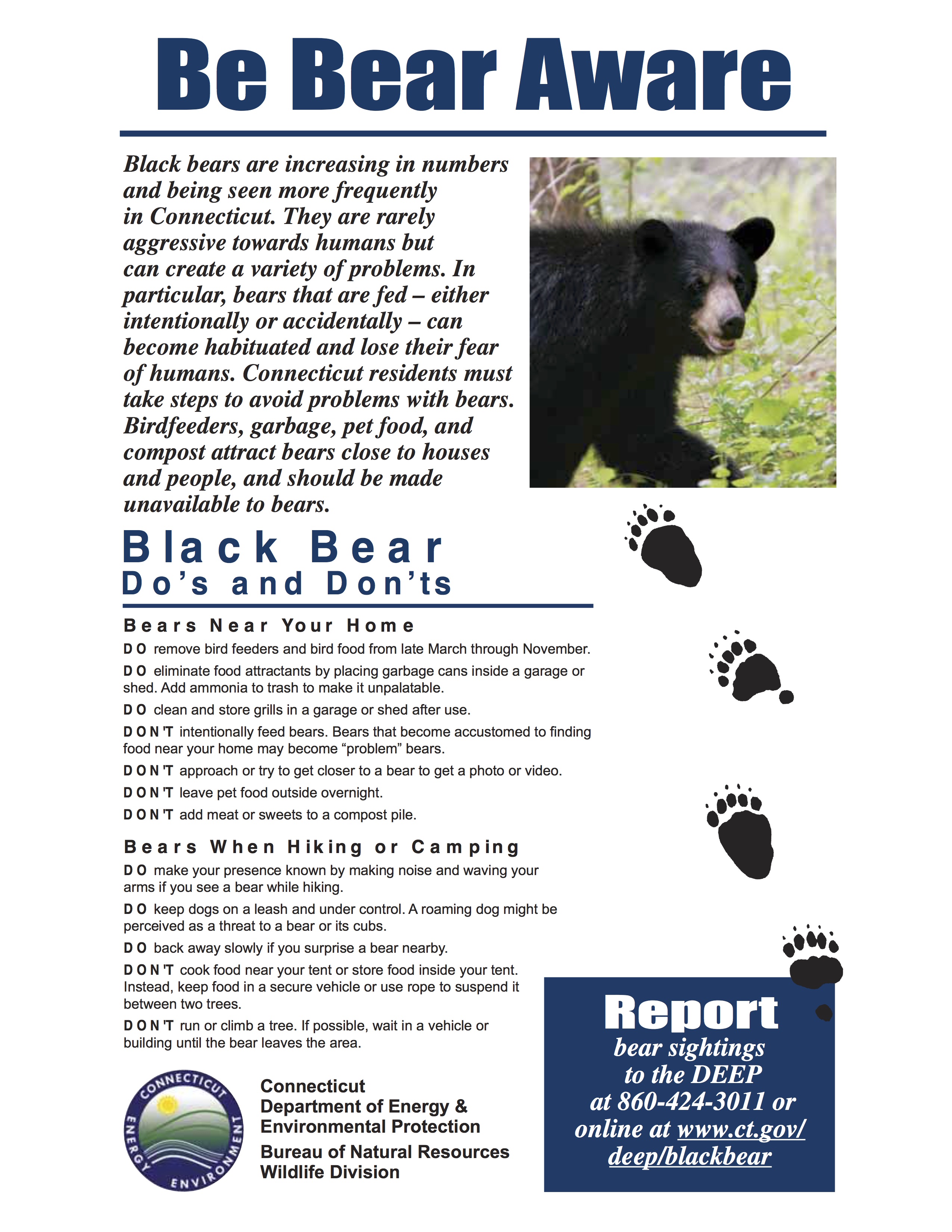Black Bear Do's and Don'ts
Black bears are becoming increasingly common in Connecticut as the population continues to grow and expand. Reports of bear sightings, even in heavily populated residential areas, have been on the rise. The Wildlife Division has also seen an increase in the number of reported problems with black bears. The primary contributing factor to bear nuisance problems is the presence of easily-accessible food sources near homes and businesses. Fed bears can become habituated and lose their fear of humans. Bears should NEVER be fed, either intentionally or accidentally. Connecticut residents should take the following simple steps to avoid conflicts and problems with black bears:
BEARS NEAR YOUR HOME
Bears are attracted to garbage, pet food, compost piles, fruit trees, and birdfeeders.
DO remove birdfeeders and bird food from late March through November.
DO eliminate food attractants by placing garbage cans inside a garage or shed. Add ammonia to trash to make it unpalatable.
DO clean and store grills in a garage or shed after use. (Propane cylinders should be stored outside.)
DON'T intentionally feed bears. Bears that become accustomed to finding food near your home may become "problem" bears.
DON'T approach or try to get closer to a bear to get a photo or video.
DON'T leave pet food outside overnight.
DON'T add meat or sweets to a compost pile.
BEARS SEEN WHEN HIKING OR CAMPING
Bears normally leave an area once they have sensed a human. If you see a bear, enjoy it from a distance. Aggression by bears towards humans is exceptionally rare.
DO make your presence known by making noise while hiking. Hike in groups. If you see a bear, make enough noise and wave your arms so the bear is aware of your presence.
DO keep dogs on a leash and under control. A roaming dog might be perceived as a threat to a bear or its cubs.
DO back away slowly if you surprise a bear nearby.
DON'T approach or try to get closer to a bear to get a photo or video.
DON'T run or climb a tree. If possible, wait in a vehicle or building until the bear leaves the area.
DO be offensive if the bear approaches you. Make more noise, wave your arms, and throw objects at the bear. Black bears rarely attack humans. If you are attacked, do not play dead. Fight back with anything available.
DON'T cook food near your tent or store food inside your tent. Instead, keep food in a secure vehicle or use rope to suspend it between two trees.
BEARS, LIVESTOCK, AND BEEHIVES
Bears occasionally attack livestock (chickens, goats, etc.) and damage beehives.
DO protect livestock with electric fencing and move livestock into barns at night if possible.
DO reinforce beehives to prevent them from being knocked over or protect them with electric fencing.
WHEN BEARS COME TO VISIT
If a bear is seen in your town or neighborhood, leave it alone. In most situations, if left alone and given an avenue for escape, the bear will usually wander back into more secluded areas. Keep dogs under control. Stay away from the bear and advise others to do the same. Do not approach the bear so as to take a photo or video. Often a bear will climb a tree to avoid people. A crowd of bystanders will only stress the bear and also add the risk that the bear will be chased into traffic or the crowd of people.
If a bear is in a densely populated area, contact the DEEP Wildlife Division (860-424-3011, Monday-Friday, 8:30 AM-4:30 PM) or DEEP Dispatch (860-424-3333, 24 hours) to report the sighting and obtain advice. The mere presence of a bear does not necessitate its removal. However, the department may attempt to remove bears from urban locations when there is little likelihood that they will leave on their own and when they are in positions where darting is feasible. The department attempts to monitor bear activity in developed areas in coordination with local public safety officials. Coordination and cooperation with officials on the scene and local police officials is a key, critical ingredient in educating the public and assuring a safe, desirable outcome in such a situation.
N
Submitted by New Fairfield, CT
